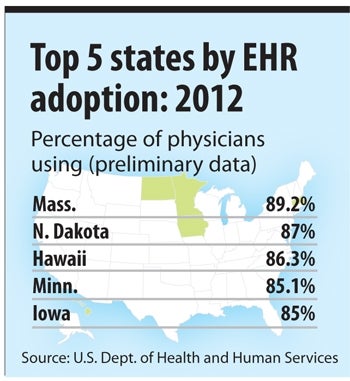Small medical practices pay hefty toll for health records updates
The Massachusetts health care industry has entered an era of uncharted territory, now that the state can force providers to spend tens of thousands of their own money on information technology infrastructure to help them share patient records more easily.
Massachusetts may be viewed as a pioneer on this front. It's the first state to launch a state-sponsored electronic health records system — known as the MassHIway — that's designed to link providers from across the state. The idea is to reduce time spent managing paper records while improving health care quality by avoiding mishaps like administering medication that a patient is allergic to, or one for which a patient might have an adverse reaction when mixed with another drug.
Both of these goals are what the 2012 Health Care Cost Containment Bill was designed to meet, but the cost is steep, especially for small medical practices.
By 2017, all providers — from large hospital systems to solo practitioners — in Massachusetts are required to sign onto the Mass HIway (between 15 and 20 percent have yet to do it, according to state officials). Signing on is relatively easy and cheap. But what's not cheap is the cost of the electronic health records (EHR) systems that they need to share information.
There's a huge cost range attached to EHR systems. The federal government estimates that a provider might spend anywhere between $15,000 and $70,000. But that doesn't account for ongoing expenses related to running it, like paying an IT professional to troubleshoot problems, or a software developer to write code. Those are two expenses that Laura Glazier, practice manager at her husband's Worcester urology office, readily laments.
‘Tremendous expense’
“It's a tremendous expense that I've never had before, and they just keep going up,” Glazier said, referring to “meaningful use” requirements issued by the federal government for providers that have received federal incentives to help pay for implementing EHRs, as Glazier's practice has.
Glazier said those incentives help providers get started, but they're relatively minor when considering the total cost of buying and maintaining an EHR system. And she has perspective, given that her husband, Dr. Wayne Glazier, was among the first wave of providers to pursue an EHR system back in 2007.
“It's good patient care; there's no two ways about it,” Laura Glazier said. “It's an absolute fallacy that any practice is going to save money by doing this.”
State officials would dispute Glazier's opinion on the cost benefit of implementing an EHR system. They tout conversion from paper charts to electronic records can curb costs because managing electronic records takes less time. Glazier doesn't dispute that, but she doesn't believe the time savings outweighs the cost of keeping an electronic system.
Manu Tandon, chief information officer for the state Executive Office of Health and Human Services (EOHHS), which launched the MassHIway, believes the total cost benefit to Bay State providers will be seen when most have electronic systems up and running and are signed onto MassHIway. That includes small, medium and large health care providers from all sectors, including specialty care and mental health care.
The small and specialized providers have, in general, been the slowest to switch to electronic records systems, Tandon said. There is some skepticism among doctors, particularly those who own very small, specialty practices, about how much electronic records and MassHIway will benefit them, he said.
“I run into small providers that absolutely love it and then I run into providers that find it very challenging, and they wonder why they have to do it,” Tandon said.
Regulations incomplete
Exactly what will happen to providers who don't comply by the 2017 deadline is not clear, as EOHHS is currently writing regulations that provide guidance for implementation. Tandon said those will be available within the next nine to 12 months. But even he doubts Massachusetts will see full compliance.
“The real question is, 'Do we get substantial mass in the system, in order for us to actually be able to avoid repeated tests … (and avoid administering) drugs that could have an adverse effect?' ” Tandon said.
Girish Navani, CEO of Westborough-based eClinicalWorks, said certain specialized providers, such as oncologists, may find an EHR mandate frustrating because many systems aren't geared toward the kind of work they do. Those are the providers who might be most hesitant to make the switch to electronic systems, he said, though finding a highly-customizable product is a good solution.
Whatever their reasons to resist, Navani said it's only a matter of time before providers everywhere will convert. Not only is it the law in Massachusetts, Navani said other states are sure to follow suit. And while some exception will likely be made here, based on individual circumstances, he said electronic health systems and connecting through MassHIway are beneficial in most cases.
“Almost everybody should have an EHR, and they will,” Navani said.
Where’s the ROI?
Thomas Handler, who covers EHRs at Connecticut-based IT research firm Gartner Inc., said Navani's assertion is true. While the federal government has yet to require that all health care providers adopt EHRs, it has said it will cut reimbursements for anyone treating Medicare patients who is not using an EHR system by 2017.
“We can quibble over the timing, but at some point in the relatively near future, all clinicians will use an EHR,” Handler said. He added that many patients already do not want to see physicians who don't use them because EHRs are viewed as a best practice, especially when it comes to avoiding the mixing of drugs.
As for the return on investment, Handler admitted it's difficult to measure when or if providers will break even after investing in EHRs. Most providers complain that implementing new systems harms productivity up front since they need extra time to train staff in their use. But eventually, they also save on real estate costs because paper charts take up costly space that could be used for more patient rooms, Handler said. They also provide important documentation of the care patients receive, which may be significant.
“If the EHR prevents one malpractice case, it's more than paid for itself,” Handler said.












0 Comments